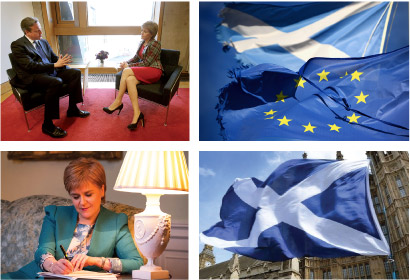5.2 What next?
The results of the EU Referendum on 23 June 2016 have caused debate both within Scotland and within the UK. In Scotland the vote was 62% in favour of remain but within the UK overall the vote was 51.9% to leave the European Union. Article 50 of the Lisbon Treaty was triggered by the UK’s Prime Minister, Teresa May, on 23 March 2017. Following this the Scottish First Minister, Nicola Sturgeon, responded by writing to the UK Prime Minister, Teresa May. The letter expressed frustration over the way in which the devolved administrations have been consulted over Article 50. The EU set out its position in the European Council (Art. 50) guidelines for Brexit negotiations issued on 29 April 2017.

These events were followed by a UK general election on 8 June 2017. This election changed the political landscape of both Scotland and the UK resulting in a minority government for the UK. This had a number of consequences including:
- for the moment, until the terms of the negotiations over the UK’s exit from the EU are clear, a second independence referendum in Scotland is unlikely to be held.
- the UK government was not returned with the anticipated majority. This resulted in a confidence and supply agreement with the Democratic Unionist Party (DUP) which has an impact on the approach taken to negotiations.
Debate over the terms of the UK’s exit from the EU will continue well into 2018. The outcome of negotiations and any roles of the administrations in Scotland, Wales and Northern Ireland in that process remain unclear. The negotiations are unlikely to be reported on in an unbiased manner with information coming from a number of sources. This makes it difficult to gain a clear overall picture. The UK is one of 28 member states and all member states will be consulted.
The UK remains a member of the European Court of Human Rights and a signatory to the European Convention on Human Rights. Although often confused with the EU and the Court of Justice of the European Union they are in fact separate institutions.
The EU currently exercises powers which come within the remit of the devolved administrations, for example, agriculture, as those EU powers cover devolved matters. The position in relation to the return of powers directly from the EU to the devolved administrations is a complex matter over which the devolved administrations and UK Government disagree.
The Scottish Parliament (and the devolved assemblies in Wales and Northern Ireland) as part of its legislative competence has to ensure that all laws comply with EU law. An amendment of some form will be needed to the 1998 Scotland Act in relation to legislative competence. This will be dependent on the outcome of negotiations.
